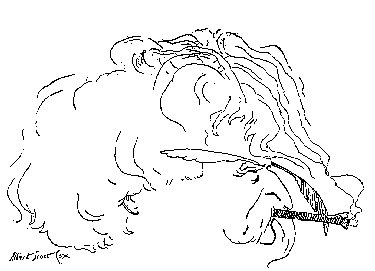

MARK TWAIN'S SECRET BOOK GIVES STARTLING VIEWS
The Humorist Wrote His Serious Thoughts on Religion and Life and Had Them Printed for Private Circulation Among His Intimates

The Caricature of Himself That Mark Twain Liked Best.
(Reproduced from The New York Times of Sunday, Sept. 2, 1906)
When this sketch appeared in The Sunday Times Mark Twain wrote expressing a desire to obtain the original if possible. Upon its receipt he wrote to Mr. Cox, saying: "I do not know how to sufficiently thank you for the original of that caricature. I prize it and shall honorably frame it and keep, for it is he best one I have ever seen of myself.
Here is a surprise for those who think they know their Mark Twain well.
A few years ago the man whom all the world knew as a humorist wrote a book the philosophical drift of which was thus characterized by the author in one of the closing chapters: "It is a desolating doctrine; it is not inspiring, enthusing, uplifting. It takes the glory out of man, it takes the pride out of him, it takes the heroism out of him, it denies him all personal credit, all applause; it not only degrades him to a machine, but allows him no control over the machine; makes a mere coffee mill of him, and neither permits him to supply the coffee nor turn the crank; his sole and piteously humble function being to grind coarse or fine, according to his make, outside impulses doing all the rest."
A strange philosophy for a humorist! but it represented Mark Twain's real view of life. Why did he keep it hidden during all the years that he was addressing - nearly always with a smile - the public? In a prefatory note to the book, he answers the question in this wise:
February, 1905. The studies for these papers were begun twenty-five or twenty-seven years ago. The papers were written seven years ago. I have examined them once or twice per year since and found them satisfactory. I have just examined them again, and am still satisfied that they speak the truth.
Every thought in them has been thought (and accepted as unassailable truth) by millions upon millions of men - and concealed, kept private. Why did they not speak out? Because they dreaded (and could not bear) the disapproval of the people around them. Why have I not published? The same reason has restrained me, I think. I can find no other.
Mark Twain really never published the book. He had 250 copies printed for private circulation only. The book was anonymous, the author distributing it only among his intimate friends.
"What Is Man?" is the title, and the only inscription on the book cover. On the second fly leaf are printed, "Copyright, 1906, by J. W. Bothwell," (Mr. Bothwell was at that time Mark Twain's private secretary,) and "Printed by the De Vinne Press. 1906." The matter in the book fills up 140 pages.
This is an illustration of how well the secret has been kept: THE TIMES reporter interviewed a man who is an expert in Mark Twain's bibliography. Said he: "I had never even head of the book until a few days ago, when I received a note from a man asking if I could give him any information about an alleged Clemens secret book, of which he had heard a rumor. I had to reply that I was even more in the dark than he."
A few years ago Mr. Mitchell Kennerley of this city was a passenger on the ocean liner on which Mark Twain was traveling to England to receive his degree of Doctor of Laws from Oxford University. They had many conversations on the subject of man's moral and spiritual makeup - a subject that seemed to be very close to the humorist's heart.
At the close of their last conversation Mark Twain said: "I have written down my thoughts on this subject and put them in book form. I have presented this book only to friends, and will be glad to give you a copy. When I'm dead - well, when a man is dead the public will forgive him most anything."
It is through Mr. Kennerley's courtesy that THE TIMES is able to give the following extracts from the book, which summarize Mark Twain's hitherto concealed philosophy of life.
The book is in the form of a dialogue between an Old Man and a Young Man. The Old Man had asserted that a human being is merely a machine and nothing more. The Young Man objected and asked him to go into particulars and furnish his reasons for this position.
[The article concludes with a lengthy extract from "What Is Man?".]
Return to The New York Times
index

Quotations | Newspaper Articles | Special Features | Links
| Search